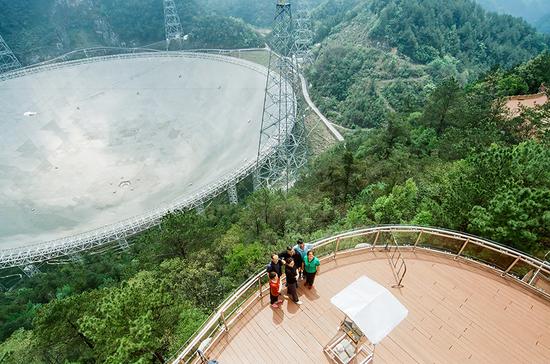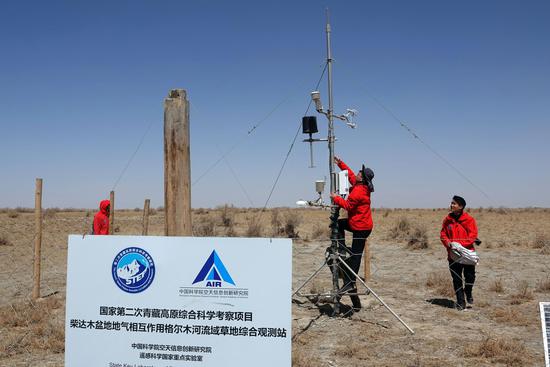
Xia Mengren (center) lives in Bali, Indonesia, and takes on work assignments from China. CHINA DAILY
Top talent
In March last year, Xia Mengren, 29, quit her job at an internet company in Shanghai and traveled to Dali, Yunnan province, where she contacted the digital nomad community. During her four-month stay, she lived the life of a digital nomad — working while traveling, and enjoying both experiences. After returning to work in Shanghai for three months, she decided to resign again and go to Bali, Indonesia, one of the world's top destinations for digital nomads.
"Top talent from different countries and industries comes to Bali. I want to become mixed-blooded culturally by living in different countries with different languages and lifestyles," said Xia, who worked as operations supervisor at an internet company in Shanghai for six years.
Xia can work from anywhere as long as she has a computer. She can operate while watching the sunset on a beach, while enjoying delicious food, or even when brainstorming work ideas in the jungle.
"The biggest benefit of being a digital nomad is discovering how big the world really is. I feel that my life has now become more diverse, and my horizons have expanded. Life is not just about working, it's a multi-faceted process," Xia said.
She has extensive work expertise. As a blogger, Xia regularly produces content and has taken courses on career development. She also offers paid-for career advice services and provides information technology planning services.
Xia is working with friends to establish an export marketing agency, and also has a keen interest in artificial intelligence.
"Being a digital nomad gives me access to the most advanced lifestyles around the world while enjoying the benefits of China's booming internet economy, as I am earning money from China and spending it in Indonesia," Xia said.
She plans to travel to Europe, where more nations are offering visas to allow non-European Union citizens to temporarily live in a country while working for foreign companies.
The MBO Partners report also showed that one-fifth of digital nomads polled reported an annual income of less than $25,000. However, 44 percent said they earned $75,000 or more.

Digital nomads Ding Feng and his wife Pan Shiyu work away from offices, taking on freelance video editing, writing assignments and design projects. CHINA DAILY
Pan Shiyu, 31, and her husband Ding Feng, 33, who worked in high-pressure jobs in Shanghai and Hangzhou, capital of Zhejiang province, for several years, never intended to become digital nomads.
"We planned to travel north to south by camper van along the Pan-American Highway from Mexico to Argentina and record our journey on videos," said Pan, who worked for a leading marketing consultancy in China for three years and is now a classical yoga teacher and freelance writer.
In October 2019, the couple flew to Los Angeles, before heading to Guadalajara, the second-largest city in Mexico. They spent 18 months living and traveling in Mexico.
In three and a half years, they traveled to eight countries, experiencing life in a camper van, community living, art residencies, and becoming digital nomads in cities. They spent four months in Peru before finally settling in Bali in December.
"We wanted to explore new possibilities and find a more fulfilling lifestyle. Our biggest motivation was to escape the fast-paced, atomized lifestyle of big cities and seek closer, more intimate relationships in indigenous cultures," said Pan, who met Ding 15 years ago during a long-distance road trip.
Due to the COVID-19 pandemic, the couple's plan to travel from Mexico to the southern tip of Argentina by camper van was put on hold. Stuck in Mexico, they looked for online job opportunities to earn a living and continue their travels once the pandemic subsided.
Ding began searching for freelance design projects on platforms he had used before, while Pan started learning video editing and sought freelance writing opportunities. She eventually became a writer for Lonely Planet magazine.
By the latter half of 2021, the couple's social media account was generating a steady income, and last year they launched a paid-for knowledge-sharing platform.
"Being a digital nomad enables you to choose different places to live — offering significant advantages for improving and enriching your quality of life," Pan said.
"However, due to a lack of stable income, digital nomads may find it difficult to form deep, long-lasting friendships, especially those who are single."
Pan and Ding continue to live as digital nomads. Their daily routine includes meditation, exercise, work and traveling by motorcycle. They planned to leave Bali at the end of last month to visit various destinations.
"Our ideal lifestyle is to have one or two homes, preferably in natural environments, where we can gain a sense of community, be surrounded by like-minded friends, have the freedom to travel at any time, learn, teach, visit friends, and pursue other goals free of time constraints," Pan said.
Market consultancy Gartner found that 31 percent of the world's workforce was working remotely by the end of last year, either full- or part-time. Some 53 percent of these workers were in the US and 28 percent were in China.
More co-working spaces are starting to appear in rural areas of China, partly because of improved internet connectivity. As of June, 28 percent of the nation's internet users lived in rural areas, data from the China Internet Network Information Centre show.
Dali has long been known as a backpackers' paradise, with its Old Town now a meeting point for digital nomads.
About a 10-minute walk from Old Town is Dali Hub, a three-story building in a quiet street that offers digital nomads co-working spaces, accommodations and rooftop mountain views. There is a similar hub in Anji, Zhejiang, which provides co-working spaces and creative areas for digital nomads who want to live in harmony with nearby tea producers.


















































 京公网安备 11010202009201号
京公网安备 11010202009201号